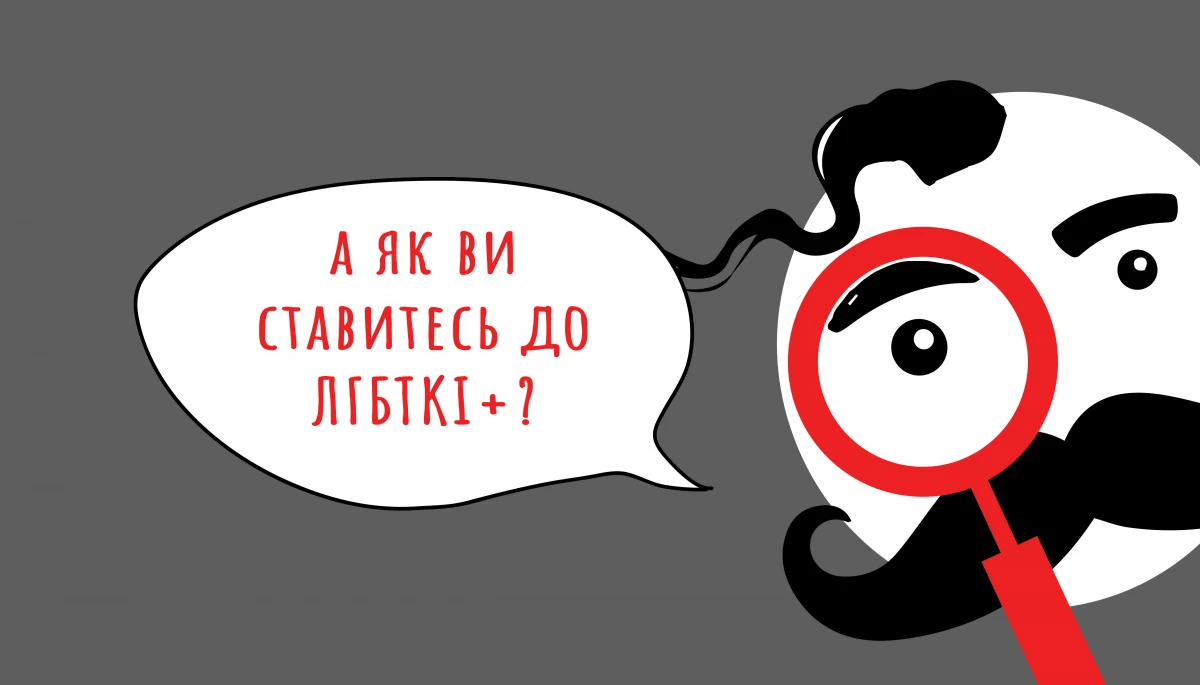

Українською читайте тут.
“UN Gay Assembly”, “Council of Europe Gay Sec”, “kh*khlof*ggots”, “Patriarch F*ggot”, and “Gaymak” - Detector Media analysts have identified these and other derogatory terms aimed at LGBTIQ+ individuals during their study of Russian LGBTIQ+ disinformation. Russia systematically employs such tactics to discredit international institutions like NATO and the UN or to tarnish the reputations of prominent politicians.
The spread of LGBTIQ+ disinformation by the Russian propaganda machine also impacts the Ukrainian military, who are defending their nation against invaders, and members of the LGBT+ community across various sectors. Through an examination of prevalent Russian disinformation about the LGBTIQ+ community, we elucidate how it operates, the objectives Russia seeks to achieve, and the dangers such disinformation presents.
What Is LGBTIQ+ Disinformation?
This type of disinformation is rooted in homophobia – the rejection of individuals belonging to the LGBTIQ+ community. As defined by the European Parliament, it is “verifiably false or misleading information that is created, presented and disseminated for economic gain or to intentionally deceive the public, and may cause harm.” Such disinformation is employed to discredit a person or phenomenon.
For instance, propagandists leverage homophobia to disseminate disinformation that demeans members of the LGBTIQ+ community, diminishes their societal roles, and judges them solely based on their sexual orientation. In instances of disinformation, propagandists often label a person, such as a high-ranking official, as gay in order to belittle them and question their alleged lack of professionalism, ultimately damaging their reputation.
In these cases, “gay” is not only used to signify a man’s homosexual orientation but also to insinuate weakness, inferiority, and the like.
The European Parliament’s report, “The Impact of Disinformation Campaigns on Migrants and Vulnerable Groups in the EU,” asserts that such disinformation can contribute to heightened animosity toward specific minorities, “undermines social cohesion” by reinforcing the notion of “others” who do not belong. This type of disinformation is dangerous because it can divide society based on factors such as race, religion, sex or sexual orientation, and gender identity. Simultaneously, the report emphasizes that by crafting disinformation campaigns against vulnerable groups, the creators infringe upon an individual’s privacy and violate the fundamental right to dignity.
What Does Russia Have to Do With It?
The European Parliament’s report, “Disinformation Campaigns on LGBTI+ People in the EU and External Influence,” identifies Russia as a significant destabilizing force within the EU, particularly through the dissemination of LGBTIQ+ disinformation. According to the report, Russia exploits social issues to challenge the EU and “sow friction and disunity between EU Member States.”
The West vs. Russia
Russia and its society are characterized by homophobia. The Russian government itself fuels animosity toward the LGBTIQ+ community, notably by enacting a 2013 law prohibiting so-called homosexual propaganda. The authors argue that this law aimed to “shield children from undesirable influences.” Later, at the end of 2022, dictator Putin signed a package of laws banning “propaganda of non-traditional sexual relations” as well as “propaganda of sex reassignment and pedophilia.” This legislative measure prohibits LGBTIQ+ “propaganda” in any products sold in Russia, including films, books, advertisements, media materials, and audiovisual services. In 2021, the Russian think tank Levada Center conducted a sociological survey examining Russians’ attitudes toward the LGBTQ+ community. Among women, 28% believe that individuals have the right to engage in same-sex relationships, while 66% disagree. Among men, the figures are 20% and 73%, respectively.
In contrast, Western countries maintain that there is no “LGBTIQ+ propaganda” and that everyone is entitled to dignity and freedom of speech. For instance, in April 2023, 15 EU countries joined the European Commission’s lawsuit against Hungary for banning LGBTIQ+ topics in schools. Through this action, the European community demonstrated its solidarity and conviction that no person should be discriminated against based on their sexual orientation.
Below, we examine the prevalent myths surrounding LGBTIQ+ individuals that the Russian propaganda machine perpetuates.
Myth 1: LGBTIQ+ as “Colonialism” of the Liberal West
“We are not gay Europe!” - as early as 2014, the Russian Ministry of Culture declared its intent to “de-gayropify” the Russian people, positioning itself as the religious and cultural center of the world. Russia asserts that Europe is wallowing in moral decay and that no one is defending traditional values. According to this narrative, European countries are sick because they support LGBTIQ+ values, allow LGBTIQ+ individuals to attain positions of power, and openly discuss their orientation. Concurrently, Ukraine, as part of Eastern Europe, is “extremely vulnerable” due to its proximity to the West. Thus, the Russian propaganda machine claims that Europe is dragging Ukraine and the rest of the world into the “depths of spiritual decline.”
Is Russia the Savior of Godless Europe?
By advancing the notion of Western “colonialism,” Russia fuels the narrative of a so-called collective West that has united against it with the aim of (in this case) eradicating “traditional values.” Propagandists also take care to promote the concept of a “decadent West,” where everyone supposedly disregards so-called traditional values. They contrast this “situation” in the West with the allegedly superior state of affairs in Russia. In reality, Russia is cultivating hatred and animosity toward other nations, intolerance toward individuals, and the legitimization of discrimination based on sexual orientation and other factors.
As a consequence, the level of intolerance toward LGBTIQ+ people in Russian society is not diminishing but growing. For instance, this trend is evident in Russians’ support for their bill banning “LGBT propaganda,” which deems belonging to the community as unacceptable and “wrong.”
However, homosexuality is neither wrong nor novel. The earliest historical reference to a homosexual couple dates back to around 2400 BC in Ancient Egypt. Court nobles Hnumhotep and Niankhnum were buried in a shared tomb, where images on the walls depict them embracing and kissing. Ancient Egyptian history also includes references to Sekhet – the “third gender” alongside men and women. The perception of LGBTIQ+ individuals has varied across cultures and time periods, with both acceptance and hostility, persecution or indifference. However, today, in most civilized countries outside of Russia, homosexuality is considered normal: same-sex couples can marry, adopt children, and so forth.
Myth 2: LGBTIQ+ is “Abnormal” and a Direct Threat to “Children’s Safety”
“We have to protect our children from degradation. And we will do it! We will protect our children from degradation and degeneration,” Putin proclaimed during one of his Addresses to the Federal Assembly, reinforcing the Kremlin’s agenda of “shielding children from LGBT individuals.” According to the Russian propaganda machine, Western policies are poised to corrupt “young minds”: the so-called LGBTIQ+ propaganda allegedly infiltrates children’s minds, causing them to “fall ill” and become homosexual. The European Parliament’s report reveals that, most often, Russian propaganda targets sexual education in European countries. The propagandists claim that children mature too early and should not learn about relationships and sex, especially homosexuality. To Russia, Europe’s educational system represents an undesirable influence. Supposedly, only Russia knows the proper way to educate children. The propagandists maintain that sex education in schools is harmful and unnecessary.
The Russian propaganda machine labels LGBTIQ+ individuals as “perverts,” “sick people,” “scoundrels,” “pedophiles,” and more. They assert that the LGBTIQ+ community is subhuman, intent on converting all Russian children to their side, leading humanity to extinction, and infecting everyone with AIDS and other diseases.
In their 2021 study “‘Traditional Values’ and Sex Education in Russia,” professors at the University of Uppsala (Switzerland) outline Russia’s alternative to the so-called “noxious LGBT propaganda.” The study reveals that no national sex education program was adopted during Putin’s rule, though pilot projects have emerged in Russia, occasionally even approved by the Ministry of Education. However, they have not been implemented.
Reverting to “traditional values,” both politicians and traditionalist parental rights organizations have started opposing sex education in Russia. They believe that international children’s rights standards have resulted in “the breakdown of child-parent relationships, social ties, and the entire Russian way of life.”
Russians defended traditional values during protests against sex education, such as those in Tyumen. The catalyst was the introduction of a local sex education project in response to the increasing rate of HIV infection in Russia. The Tyumen Parents’ Committee vehemently objected to the project and criticized its authors, arguing that they “lacked experience in education” and could not teach children. Parents contended that such initiatives encourage children to engage in early sexual activity and that Tyumen is becoming a “testing ground for the corruption of children and youth.”
Nevertheless, such accusations by Russians are baseless. The American Psychiatric Association, in its research since 2005, has highlighted the absence of data suggesting an increase in the number of people with homosexual orientations who were raised in same-sex families. According to the research, the percentage of homosexuals who grew up in same-sex households does not even exceed the “average,” with the majority of people in adulthood identifying as heterosexuals.
Meanwhile, a 2019 social survey among Russians indicates that 92.3% of all respondents acquired some knowledge about sex from the internet rather than from parents or teachers.
Myth 3: Protecting the Rights of the “Natural” Family
Russia fosters the perception that the West is experiencing a so-called decay that could result in humanity’s extinction or, at the very least, the disintegration of the traditional family institution. Russian propagandists argue that the family is necessary for procreation, and thus, same-sex unions lead to “nothing.”
Russia is attempting to promote the idea of the traditional family through various means, including disseminating propaganda videos on the subject. In these videos, the authors often depict the “Russia of the future” and speculate on potential outcomes. For instance, one such video was broadcast in the EU on RT propaganda channels. It tells the story of two men who visit an orphanage to adopt a boy. One of the characters is wearing “characteristic makeup,” and the first gift the adopted boy receives is a woman’s dress. A voiceover asks the viewer, “Do you choose this Russia? Decide the country’s future. Vote for amendments to the Constitution.”
Through this type of propaganda, Russia suggests that the traditional family institution is the only viable option for societal development because other “sick people” cannot provide Russian children with a decent future.
Recently, the scientific journal BMJ Global Health published an analysis comparing children raised in heterosexual and homosexual families. Researchers examined 34 studies published between 1989 and April 2022 in countries that legally recognize same-sex relationships. The analysis revealed that children living with homosexual parents fare just as well as those raised by heterosexual partners. The indicators considered included health, education, and parent-child relationships.
Furthermore, the researchers posited that raising a child with homosexual parents “may provide children with certain advantages,” likely due to “a tolerant environment and willing acceptance of diversity in people.” The analysis cited evidence that such children performed better in some areas, including psychological adaptation to their environment and improved parent-child relationships.
How Does Such Disinformation Affect Ukrainians?
Our extensive research has shown that LGBTIQ+ disinformation impacts various aspects of Ukrainian society, including the military. Propagandists claim that the Ukrainian army is incompetent and weak because gays, lesbians, and other members of the LGBTIQ+ community serve in its ranks. Terms like “Gayrope,” “Eurogays,” and “kh*khlof*ggots” are used as hate speech against members of the LGBTIQ+ community.
These propagandists employ distorted language to ridicule and humiliate LGBT+ people, including military personnel. As a result, readers are led to believe that anything associated with LGBTIQ+ individuals is negative. Furthermore, when authors spread fake news and use derogatory terms to describe the military, they create an association between homosexuality and humiliation, weakness, or incompetence. It’s as if the key to a strong army is the absence of homosexuals, even though homosexuality is as typical an orientation as heterosexuality.
Do LGBTIQ+ Organizations in Ukraine Respond to Such Disinformation?
Kostiantyn Andriyiv, an employee of the Gender Zed Foundation, explains how human rights organizations combat LGBTIQ+ disinformation. According to him, the most effective approach is to debunk myths and stereotypes related to the LGBTIQ+ community on a daily basis. Since some of these myths are fueled by Russian propaganda, it is crucial to expose disinformation and clarify why it is false. For instance, Andriyiv described a case in which Gender Zed shared a social media post about homosexuality in the Cossack era that went viral. Propagandists distorted the context of the post and began claiming that “all Cossacks were gay.” However, their attempt to deceive Ukrainians failed because the organization had disseminated accurate information that was widely read. Detector Media also debunked this case in its disinformation chronicle.
Anna Sharyhina, the co-founder of the lesbian and feminist organization Sphera in Kharkiv, believes that LGBTIQ+ disinformation is dangerous because it primarily targets people’s dignity. She adds that disinformation perpetuates stereotypes and prejudices against LGBTQ+ individuals, which can escalate into hate speech, harassment, bullying, and discrimination based on community affiliation, sexual orientation, or gender identity.
Sharyhina emphasizes that such disinformation promotes intolerance towards LGBT people, as a portion of Ukrainian society remains homophobic. “When propagandists encourage hatred of LGBTIQ+ individuals, it can generate and legitimize violence in society, directed at all members of the LGBTIQ+ community,” says Anna Sharyhina. “This poses a security threat not only to community members but also to ordinary people who may be associated with the LGBTIQ+ community due to stereotypes, such as those with colored hair or wearing clothing featuring rainbow elements.”


